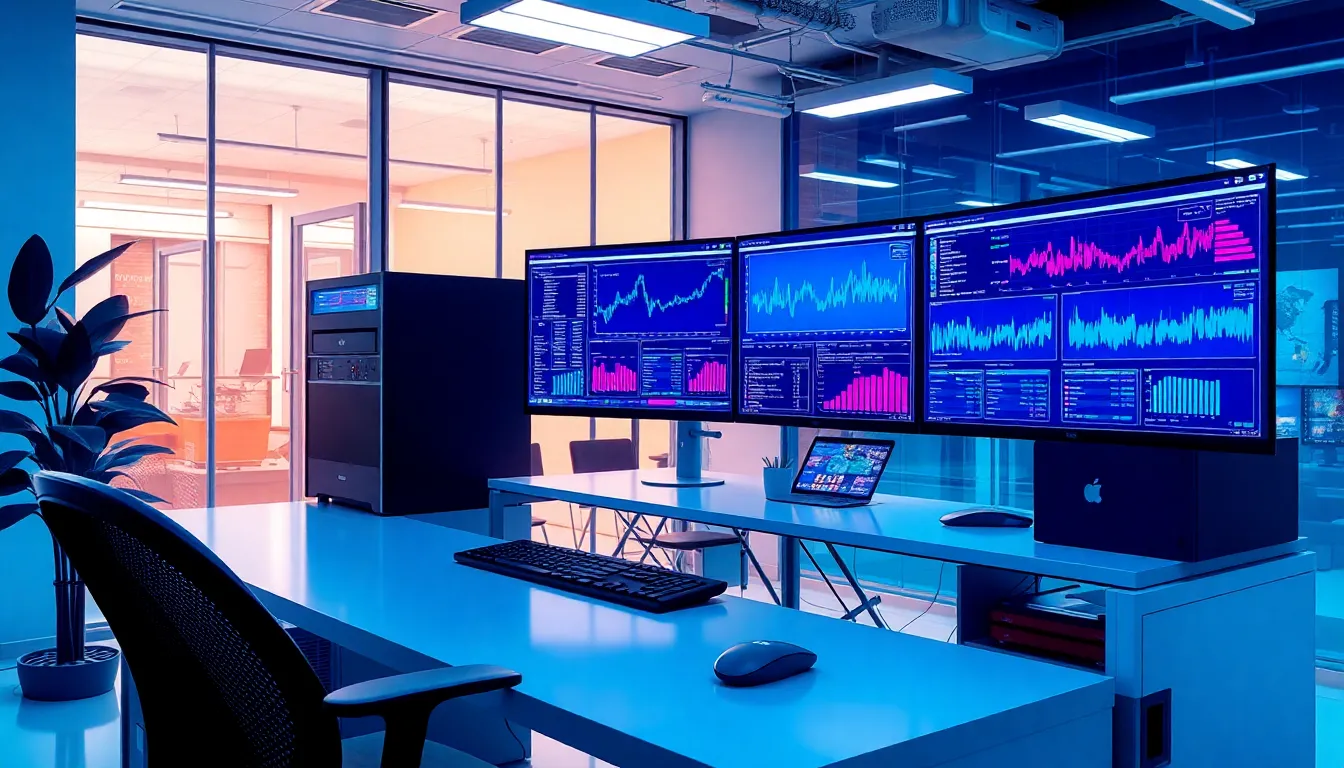Table of Contents
ToggleIn a world where technology evolves faster than a caffeinated squirrel, cyber computers are leading the charge. These high-tech marvels don’t just crunch numbers; they redefine what it means to compute. Imagine a machine that can analyze vast amounts of data while you’re still trying to remember your password—sounds like magic, right?
Overview of Cyber Computers
Cyber computers represent a significant leap in computational technology. These systems excel in processing vast amounts of data rapidly while employing sophisticated algorithms. Distinctly, cyber computers utilize advanced parallel processing capabilities, allowing them to tackle complex problems more efficiently than traditional computers.
Data analytics plays a crucial role in their performance. Cyber computers can analyze big data sets, transforming industries like finance, healthcare, and research. Many businesses harness their power for predictive analytics and real-time decision-making.
The architecture of cyber computers often includes specialized hardware components. Graphics processing units, or GPUs, are commonly integrated to enhance processing speeds. Quantum computing, a branch of cyber computing, introduces qubits that operate in multiple states, further accelerating calculations.
Security is another vital aspect of cyber computers. They implement robust cybersecurity measures to protect sensitive data from breaches. This capability is essential in sectors where information confidentiality is paramount.
Various examples demonstrate the capabilities of cyber computers. Google’s Sycamore and IBM’s Quantum Hummingbird lead in quantum technology advancements. Each system showcases unique attributes, emphasizing the potential of cyber computing.
Cyber computers redefine computing by enhancing speed, efficiency, and security. Their innovative technology propels advancements in various fields and signifies a move towards a more data-driven future.
Key Features of Cyber Computers


Cyber computers incorporate advanced features that set them apart from traditional systems. Critical elements include enhanced processing capabilities and robust security measures.
Advanced Processing Capabilities
Cyber computers excel in executing complex computations through innovative architecture. They leverage parallel processing to handle multiple tasks simultaneously, resulting in faster data analysis. Graphical processing units (GPUs) enhance these capabilities, allowing for rapid image processing and simulations. When faced with large datasets, cyber computers utilize advanced algorithms to streamline operations efficiently. Quantum computing, which employs qubits, takes this a step further by enabling computations that surpass classical limits. These features make such systems indispensable in fields like finance, healthcare, and scientific research, where instant data processing leads to timely decision-making.
Enhanced Security Measures
Enhanced security measures protect the sensitive data processed by cyber computers. Implementing encryption standards safeguards information against unauthorized access. Advanced threat detection systems constantly monitor for anomalies, ensuring proactive defenses against cyberattacks. Multi-factor authentication protocols add an extra layer of security, verifying user identities rigorously. Robust compliance with regulations such as GDPR and HIPAA underscores the commitment to data privacy. These measures, coupled with ongoing security updates, reinforce trust in cyber computing solutions across industries, proving essential for operational integrity and data confidentiality.
Applications of Cyber Computers
Cyber computers serve various applications across multiple fields, enhancing efficiency and decision-making. Their capabilities transform industries, driving innovation and providing essential tools for complex problem-solving.
In Business
Cyber computers significantly impact business operations. Enhanced data processing enables organizations to analyze vast datasets rapidly. Predictive analytics allows companies to forecast market trends and consumer behavior. Real-time data insights facilitate informed decision-making, improving responses to market changes. Cyber computers also optimize supply chain management through advanced modeling and simulation. The ability to conduct simulations allows businesses to test scenarios before implementation, reducing risks. Companies like Amazon utilize cyber computing for inventory management, ensuring real-time tracking and efficient resource allocation.
In Research
In research, cyber computers play a crucial role across various disciplines. Their powerful processing capabilities enable the analysis of complex scientific data. Researchers can explore molecular behavior in fields like genetics and chemistry. Cyber computing accelerates the discovery of new materials through simulations and predictive modeling. Moreover, medical research benefits from cyber computers in drug discovery, helping identify potential compounds more efficiently. By processing large datasets, they facilitate climate modeling and oceanography studies. Institutions like CERN leverage cyber computers to analyze massive datasets generated by particle collisions, leading to groundbreaking discoveries in physics.
Challenges in Cyber Computer Technology
Developing cyber computers involves navigating several significant challenges. These challenges impact adoption and functionality in various sectors.
Cost and Accessibility
Costs associated with cyber computer technology often present barriers for many organizations. High initial investment in hardware, software, and ongoing maintenance can deter smaller companies. Companies such as IBM and Google invest billions in research and development, which also adds to the overall expense. Accessibility issues further complicate the landscape; many regions lack the infrastructure necessary for robust cyber computing. Organizations must consider training and expertise to effectively utilize these advanced systems. As technology progresses, solutions to lower costs and improve access become imperative for widespread adoption.
Cybersecurity Threats
Cybersecurity threats pose substantial risks to cyber computer operations. Advanced computing systems often attract malicious actors keen to exploit vulnerabilities. Ransomware attacks, data breaches, and unauthorized access can jeopardize sensitive information stored within these powerful machines. Security measures such as encryption and multi-factor authentication become essential to safeguard data. Continuous monitoring and updating are critical practices for protecting sensitive information from evolving cyber threats. Organizations that rely on cyber computers must prioritize cybersecurity to sustain trust and operational integrity.
Future Trends in Cyber Computers
Rapid advancements in cyber computer technology shape the future of computing. Quantum computing rises as a pivotal trend, offering accelerated calculations through the use of qubits. This innovative approach enhances processing power, which transforms problem-solving capabilities across diverse fields. Enhanced processing capabilities drive industries, allowing for real-time analytics and improved operational efficiency.
Artificial intelligence integration stands out, enabling machines to learn from data while evolving their algorithms continually. Expect cyber computers to play a crucial role in AI development, helping automate complex tasks. In healthcare, predictive analytics derived from cyber computing helps improve patient outcomes, thereby revolutionizing treatment protocols and research methodologies.
Edge computing also emerges as a significant trend, allowing data processing closer to the source, which reduces latency. Businesses benefit from this shift, as it supports faster decision-making processes and better utilization of resources. With the continuous growth of the Internet of Things, cyber computers facilitate seamless data management across interconnected devices.
Sustainability in cyber computing gains attention as organizations seek eco-friendly solutions. Energy-efficient architectures minimize carbon footprints while maintaining high performance, thus meeting regulatory requirements. More industries will adopt green technology initiatives, making sustainability a vital consideration in the design and deployment of cyber computers.
Additionally, the focus on robust cybersecurity measures increases due to evolving threats. Sophisticated encryption standards and advanced threat detection systems gain importance, ensuring data protection in an era of cyber warfare. Organizations prioritize cybersecurity strategies to maintain operational integrity and safeguard sensitive information from malicious activities.
Overall, these trends signal an exciting future for cyber computers, significantly enhancing efficiency, security, and innovation across sectors.







